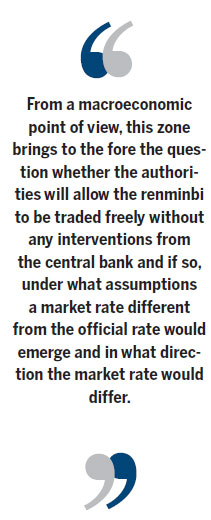Free trade zone is a test bed for renminbi
Updated: 2014-02-21 08:31
By Rolf Langhammer (China Daily Europe)
|
|||||||||||
But financial suppliers should not expect a Pudong rate determined solely by the markets
In the tradition of earlier policies, Chinese authorities have launched another small, reversible but potentially significant step of reform toward a further opening of the economy.
In the Pudong district of Shanghai they have opened a pilot free trade zone for hitherto highly regulated service sectors, in particular financial services.
As services do not face tariff borders, the border between the Pudong area and the rest of China is determined by the extent of regulatory divergence: a foreign supplier of services is not treated as favorably as a domestic supplier in the rest of China, a situation that does not occur if the supplier is in the Pudong zone. So, in terms of so-called national treatment, that is non-discrimination between both suppliers in a domestic market, the Pudong zone would meet essential targets of the World Trade Organization in freeing international trade in services.

Beyond that trade policy aspect, from a macroeconomic point of view, this zone brings to the fore the question whether the authorities will allow the renminbi to be traded freely without any interventions from the central bank and if so, under what assumptions a market rate different from the official rate would emerge and in what direction the market rate would differ.
Finally, would the central bank accept such a market rate as a signal to adjust its interventions to that rate in order to keep differences between the market and official rates small and thus help gradually erode the border between renminbi rate in the rest of China and the one in the zone?
Let us assume that a Chinese financial service supplier bets on continuing problems in the US to extend the debt break and perhaps even bets on a temporary default. He or she would offer a financial paper foreseeing a strong dollar depreciation and a stronger renminbi.
Admittedly, this is an extreme assumption. But any other supplier seeing a weaker dollar in the future for different reasons could be in a similar position. In the zone, the supplier finds a partner taking the opposite position, thus believing in a stronger dollar. The result could be a sharp appreciation of the renminbi market rate and a much lower renminbi/dollar rate than the official one.
Perhaps other suppliers in the zone would follow suit and would trigger a herd effect. Would the central bank see such a result as an unwelcome signal (for instance, for the export industry), biased, non-representative, dismiss it as a speculative outlier and even intervene in the zone to weaken the renminbi? 
Or would it accept the rate as the nutshell result for what would happen outside the zone without central bank interventions and for what China will have to accept once the renminbi is internationalized? The three-year test period aims to find the answer to that.
The uncertainty is large, both for the central bank and financial suppliers.
I do not believe the central bank will allow the Pudong renminbi rate to differ widely from the official rate, and financial markets are well-advised not to believe in a Pudong market rate exclusively determined by the markets rather than by the central bank.
The reason for my assessment is that in the coming years China will face two adverse effects in its industrial structure, which is still export-driven: an adverse price effect of trend-wise real appreciation and an adverse income effect of lower demand in international markets.
This will make the transition in employment from exports to domestic demand-driven industries more difficult. Jobs in the export industry will be wiped out long before new jobs in the latter industries will be set up. In this situation, a further push in real appreciation triggered by financial service suppliers will be regarded as unwelcome.
It would put into sharper relief the existing currency mismatch problem in China. China has returns in low-yield international currencies and commitments in local currency. An appreciation reduces the value of foreign reserves in local currency.
So, as in the past, the Pudong zone will not be a free market for foreign exchange. China will rely on its past policies, and steps must be reversible. Trials are welcome, as are mistakes and missteps, so long as they are recognized and remedied.
The author is former vice-president of Kiel Institute for the World Economy, Germany. The views do not necessarily reflect those of China Daily.
(China Daily European Weekly 02/21/2014 page11)
Today's Top News
Pandas arrive in Belgium
China urges US to correct mistakes on Tibet
9 punished for spreading flu rumor
Beijing upgrades haze alert
Ukrainian parliament dismisses president
China strongly opposes Obama-Dalai meeting
Tax refunds to lure overseas tourists
Prosecutors tackle food crimes
Hot Topics
Lunar probe , China growth forecasts, Emission rules get tougher, China seen through 'colored lens', International board,
Editor's Picks

|

|

|

|

|

|





